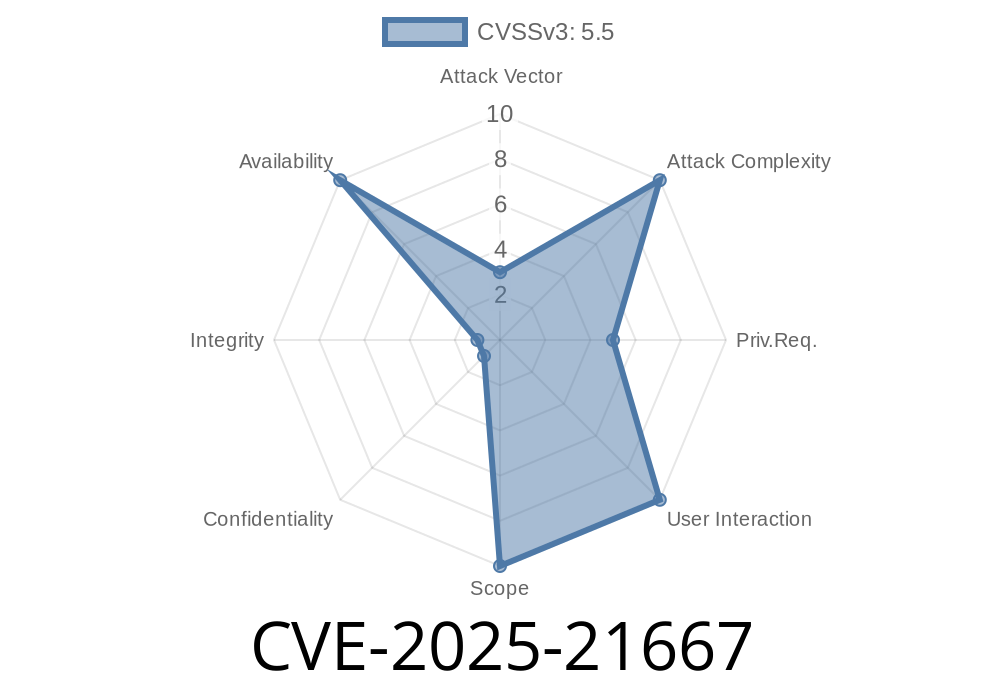The Linux kernel is the core component powering millions of systems, and small bugs can have massive consequences. Recently, a serious problem was found and patched, registered as CVE-2025-21667. This bug could cause systems running 32-bit kernels to hang, especially when dealing with the XFS filesystem. In this post, I’ll break down what happened, show real code, and explain the risk in plain English.
What Is the Vulnerability?
The bug lives in the iomap module of the Linux kernel. This part of the kernel manages how files and data blocks are mapped and managed on storage devices. The specific problem happened in a function called iomap_write_delalloc_scan().
On 32-bit kernels, the function was incorrectly using a 32-bit variable (unsigned long) for file positions, even though file positions could be much larger (64 bits). Here’s what that means in simple terms:
On a 32-bit system, using only 32-bits to track file offsets will cause problems with big files.
- In this bug, looping through file blocks could “wrap around” or never reach the end, causing the system to get stuck in an infinite loop.
The bug mainly affects the XFS filesystem, which is commonly used in servers because of its ability to handle large files and filesystems.
Let’s look at the problem area in the code
// This is a simplified snippet to show the problem
unsigned long index = folio_next_index(folio); // index may be 32-bits
loff_t pos = (loff_t)index << PAGE_SHIFT; // pos is 64-bits, but index is not
loff_t is 64 bits, meant for large file offsets.
If you shift a 32-bit integer into a 64-bit space, you lose all the higher bits. If a file’s offset is past 4GB, you run into trouble. The loop never correctly tracks the position, so it never finishes.
The Infinite Loop Scenario
Imagine a file is larger than 4GB. The code above processes the file block by block. When it gets to the part past the 4GB boundary, because of the truncation, it thinks it’s still within the first 4GB. The loop keeps processing the same blocks endlessly, using up CPU and memory. This means the process (like a heavy write to an XFS filesystem) never completes.
In real usage:
The Fix
The fix is simple but crucial. Make sure the file offset calculations use the full 64 bits, even on 32-bit systems.
Patched code
// Correct way: use 64-bit values everywhere
loff_t next_index = folio_next_index(folio); // ensure folio_next_index() returns 64 bits
loff_t pos = next_index << PAGE_SHIFT;
Alternatively, the variable types were adjusted so no more truncation would ever occur.
Links to Original References
- Linux Kernel Mailing List Patch
- XFS Filesystem Project
- CVE Record for CVE-2025-21667
Exploitation Details
An exploit for this bug is pretty straightforward:
On a 32-bit Linux machine with XFS, create or write to a huge file (over 4GB).
2. The kernel’s iomap code miscalculates the position, gets stuck, and the Kernel thread goes into an infinite loop.
3. The attacker doesn’t need privileges – any process capable of writing large files can trigger this.
*There’s no direct remote code execution or privilege escalation. But causing a server to hang or lose service time is a pretty serious DoS (Denial of Service) attack.*
Proof of Concept (PoC)
# Only run on a throwaway 32-bit XFS system!
# Warning: This may crash your machine!
fallocate -l 8G /mnt/xfs/largefile
dd if=/dev/zero of=/mnt/xfs/largefile bs=1M count=8192 conv=notrunc
# Watch system load skyrocket and processes stuck in D state
XFS filesystems with large files.
Most desktop and server systems today use 64-bit, so they’re likely safe. But embedded devices and some very old systems could be at risk.
Mitigation
Fix: Upgrade your kernel!
This bug is fixed in mainline kernels as of the referenced patch. If you operate on a 32-bit kernel and use XFS, update as soon as possible.
Workaround:
Conclusion
CVE-2025-21667 is a great example of how a small coding oversight (wrong variable type!) can lead to a serious system-wide problem. Even though 32-bit kernels are less common today, this bug shows why proper variable handling is essential. Stay up-to-date and keep your Linux kernels patched, especially when running older architectures!
If you want more details on how to patch, check out the official patch discussion.
*Remember: Even "tiny" bugs can lock up your entire server. Patch early and patch often!*
Timeline
Published on: 01/31/2025 12:15:27 UTC
Last modified on: 02/03/2025 20:00:28 UTC
